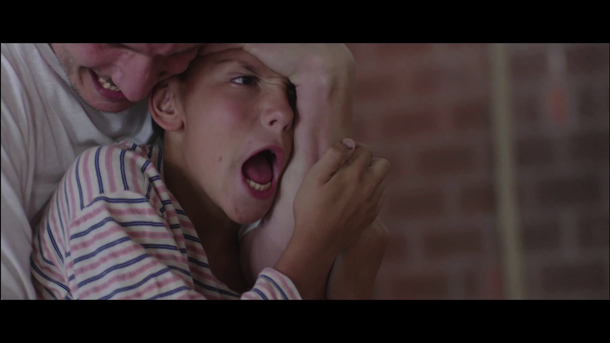
NICEJE DETE/NO ONE’S CHILD
Dir.: Vuk Rsumovic
Cast: Denis Muric, Pavle Cemerikic, Milos Timotijevic, Isidora Jankovic
Croatia 2014, 96 min. Drama Serbian with subtitles
Based on true events, Vuk Rsumovic’ debut feature NO ONE’S CHILD, a variation on Truffaut’s L’Enfant Sauvage, tells the story of a young boy of about eight, who is found in the woods near Travnk, (now Bosnia-Herzegovina) by Serbian hunters. Sent to an orphanage in Belgrade, the prognosis of re-integration into human society is not that good. Haris (Denis Muric), as he has been called randomly, kicks and spits, moves on all fours, hates wearing shoes and eats with his bare hands. His language skills are non-existent and he dislikes all human contact. It is up to Ilke (Timotijevic), one of the guardians in the orphanage, to lure him into the human world.
Ilke makes certain progress, particularly teaching Haris words by showing him objects drawn on big posters, but the real breakthrough happens when of the boys, Zika (Cemerikic), takes a liking to Haris, who is called by the derogative name “Puchke” by the rest of the boys. Zika and his girl friend Alisa (Jankovic), take Haris to a fair, and show him around the city, gaining his confidence. But later Zika decides to go back to his violent father, and Haris regresses. When Zika returns, having been beaten up badly by his father again, he can’t stay in the orphanage any more, because he is over the age limit. For a short time, Haris is looked after by Alisa, who has left the orphanage and makes money as a part-time call girl. But disaster strikes for Haris, with the outbreak of the civil war in Yugoslavia. Because of the name given to him by the men who found him, the Bosnian authorities claim him, and soon the young teenager is seen fighting with adults in the trenches.
Muric is outstanding and his physical exploits are as brilliant as his acting skills. Rsumovic avoids pathos and sentimentality, showing the case with the eyes of a documentary filmmaker. Damjan Radovanovic’ widescreen photography captures the panoramic landscapes and intimate close-ups alike with brilliant originality. Far from having the look of a debut film, NO ONE’S CHILD is a mature, but nevertheless a stunningly fresh achievement. Without being judgemental, the director lets the viewer decide which world is the more humane one: nature or the world of human relationships, fraught with permanent conflicts, build on an imaginary hierarchy, in constant flux with haphazardly changing values. Rsumovic’ elliptical parable is stunningly beautiful, and emotional harrowing, it fully deserved the FIPRESCI prize for the “Settimani di Critica” section of the Festival. AS
REVIEWED AT THIS YEAR’S VENICE INTERNATIONAL FILM FESTIVAL SEPTEMBER 2014